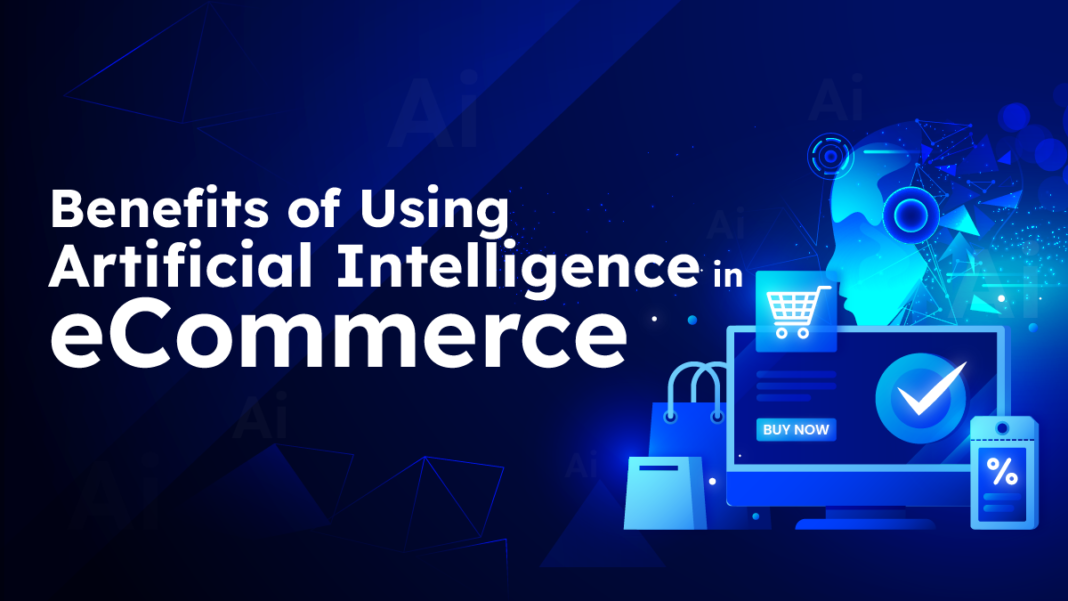Artificial intelligence (AI) has become a hot topic over the last decade. The term was coined in 1956 by John McCarthy, who defined it as “the science and engineering of making intelligent machines.” Today, AI is being applied across industries, from healthcare to finance and retail. eCommerce uses AI to improve customer service, reduce fraud, and increase conversion rates. There are several ways to apply artificial intelligence in eCommerce. From chatbots to machine learning, AI is becoming a key component of eCommerce platforms.
What are the benefits of using AI in eCommerce?
The term artificial intelligence (AI) has become quite common these days. Some experts even believe it will replace human beings within the next decade. Artificial intelligence is the ability of machines to perform tasks usually associated with humans and includes speech recognition, image, natural language, machine learning, and robotics. With AI, retailers can get insights into their customers’ behavior and preferences.
It helps them improve their marketing strategies and increase sales. Today, AI is used to enhance the shopping experience and boost conversion. Data on consumer behavior is gathered by intelligent algorithms and used to create more effective and successful business plans.
This article outlines the six ways AI, such as virtual assistants and voice commerce, merchandising, eCommerce automation, retargeting potential customers, and CRM-enabled sales process creation, can help your eCommerce business grow.
- Virtual Assistants and Voice Commerce
In eCommerce or any business, customer support is a deciding factor. Most online stores now have eCommerce virtual assistants called chatbots that use language processing technologies and machine language to respond to customer queries instantly. It is ideal for eCommerce businesses as they can quickly handle customer queries 24/7. If the question is a major one, they will guide customers to a representative who can deal with it efficiently.
In recent times, voice commerce is also gaining popularity. It’s popular, and most customers love its speed and convenience. Customers use it effortlessly to make purchases and searches. It also gives access to a massive chunk of disabled customers.
- eCommerce Personalisation
For quite some time, the constantly expanding world of eCommerce has been advancing to new deep levels of personalization thanks to the ever-improving developments in AI and machine learning technology. Since computers can now quickly process large amounts of data, real-time analytics and optimization are more manageable.
Personalization is tailoring the buying experience to each unique customer’s wants, problems, tastes, and preferences. In other words, it customizes the online shopping experience by actively and dynamically displaying material (items, brands, or campaigns) to the customer based on their past purchases, click-throughs, browsing habits, etc. Personalization is a terrific way to keep customers interested, encourage repeat business, and boost conversion rates.
Moreover, with more people turning to internet purchasing in the last few years due to COVID-19, developing individualized experiences is more crucial than ever. With individualized product recommendations, you can profit from customers’ propensity for impulse purchases.
Also, content and SEO services play a significant role in eCommerce stores. Store-owners receive hundreds or thousands of visitors daily and sell even more things. Therefore, a machine (or an algorithm) can quickly identify trends in customer behavior by analyzing the data in real-time; if a team of people was to accomplish this by hand, it would take a long time.
- Searchandising (Smart Search)
Serchandising, also known as search merchandising, is the key to profitably displaying the products in your store. Showing search results to eCommerce customers is a science that aims to increase sales, drive KPIs, and meet customer needs. Having an efficient e-commerce website is something that every AI expert strongly advises. When visiting an eCommerce website, most users first go to the search bar. Therefore, these customers are more likely to convert than those just browsing. They need to find what they are looking for, which is the issue here. The search results may be pertinent to the keywords users entered, but it does not automatically imply that they are enticing.
AI may considerably aid eCommerce (or Smart Search) with search engine marketing. You can use AI in your search functionality to make your e-commerce site stand out. Your company would accurately identify audience preferences and demands with AI-powered optimized searches. Additionally, this would make anticipating and providing what the customer requires easy.
- eCommerce Automation
eCommerce automation is software designed to transform your company’s operations, procedures, or campaigns into automated processes that respond intelligently. It is one way companies can make better use of their resources. When a firm grows, demands, complexity, and repetition increase.
Systems that formerly functioned grow progressively less effective and eventually fail. In response, businesses use time-consuming workarounds, sacrificing time that could be spent on critical tasks in favor of urgent ones, even if they only involve clicking buttons. Automation simplifies workflows at the front and back end.
Presenting new products across channels, coordinating sales, implementing discounts for devoted consumers, identifying high-risk transactions – AI automates many other tasks. Additionally, by offloading the responsibility of responding to regular inquiries, eCommerce business owners are free to focus on more complex demands.
- Retargeting Potential Customers
Retargeting, also known as remarketing, reminds your target market of your brand’s presence and products. Retargeting strategies connect with users who have previously interacted with your platform. These users may have already purchased from you in the past, or they may have given up on the buying process altogether. You may utilize AI to identify each user’s unique behavioral patterns.
Then, you can employ this information to entice these customers to your establishment. Push notifications are one of the best retargeting techniques. There is no chance of annoying the users because push alerts are brief and to the point.
Additionally, you can employ customized push alerts by using behavioral data. Customer retargeting is a marketing strategy for online businesses geared toward those who have bounced off their websites. Since retargeting lowers the cost per impression, using AI in your retargeting efforts proves economical. Additionally, retargeting keeps your brand at the forefront of customers’ minds. Therefore, they will think of you when they need something in the future.
- Efficient Sales Process with CRM
You can increase eCommerce sales using AI in various practical ways. The best way to do it is by incorporating AI into your CRM. With AI, you may modify your problem-solving options, develop a potent sales message, and increase your customer base. Many AI systems, like Siri or Alexa, support voice input and natural language learning.
They make it possible for a CRM system to respond to client inquiries by addressing any queries or issues that a customer may have, resolving their problems, and even identifying new prospects. Additionally, some AI-driven CRM systems can manage these tasks concurrently, saving business owners time and energy and increasing efficiency.
Wrapping Up
eCommerce has already seen a significant change due to AI and machine learning technology, and this change will only continue. An eCommerce company can analyze the massive amounts of data it receives every second without breaking a sweat. The necessity for this type of technology in eCommerce will only increase over time, and store owners should consider it during WooCommerce development.
Author Bio:
Marion Jones is a certified WooCommerce developer passionate about
writing WooCommerce development. Her yearlong experience with CartKnitter
helps to provide insightful articles for a wide range of customers.








